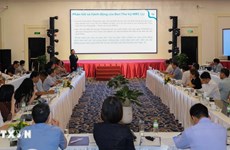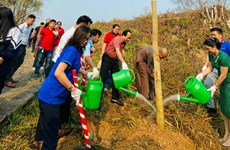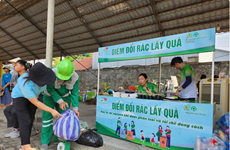Management of water resources in Mekong River: “Call for help” from figures
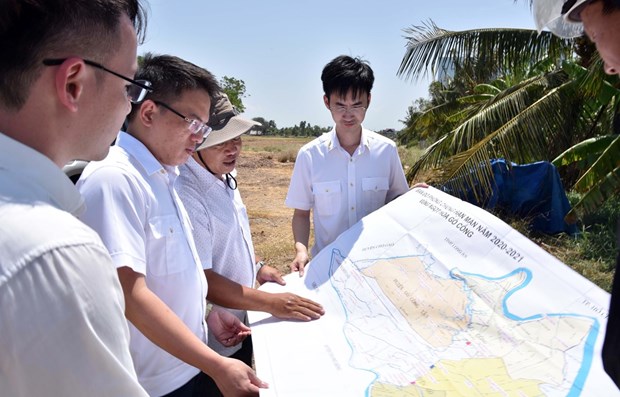 Carrying out audit on water resources management in the Mekong River basin. (Photo: VietnamPlus)
Carrying out audit on water resources management in the Mekong River basin. (Photo: VietnamPlus)The lack of specific measures to resolve disagreements over the management and use of water resources in the Mekong River basin among the countries along the Mekong River is an issue that needs to be resolved soon.
“Call for help” from figures
According to a report by the SAV, the volume of Mekong river water from upstream to the Mekong Delta region in 2020 decreased by 157 billion cu.m compared to 2011. Meanwhile, the amount of silt and sand declined by 14 million tonnes or 37 percent compared to 2017, and the volume of water dropped by 22 billion cu.m compared to 2019 and 157 billion cu.m compared to 2011. As many as 1.5 million ha of land degraded due to reduced fertility.
Saline intrusion has damaged over 500,000 ha of crop area, and caused a shortage of water for 486,000 households.
The report also showed that wild fishery stocks have decreased by 12,644 tonnes. The quality of water in many rivers and canals has been polluted, causing diseases for people.
The report detailed audit results from March 3 – April 29 at the four agencies: the Vietnam Mekong River Commission (VMRC), the Ministry of Industry and Trade (MoIT), the Ministry of Natural Resources and Environment, and the Ministry of Agriculture and Rural Development, and 12 provinces and cities in the Mekong River basin, including An Giang, Dong Thap, Tien Giang, Soc Trang, Can Tho, Tra Vinh, Ca Mau, Hau Giang, Ben Tre, Gia Lai, Kon Tum and Dak Lak.
The auditing aimed to evaluate the management of water resources and compliance with the international commitments of the Government of Vietnam in the management, use and protection of water resources in the Mekong River basin, in association with implementing the SDGs “By 2030, implement the integrated water resources management at all levels, including through transboundary cooperation as appropriate”. The auditing also focused on reviewing and identifying negative impacts due to the reduction of Mekong River water resources in Vietnam in the 2016-2020 period.
Unsynchronised management, lack of supervision
According to the SAV, the above-mentioned figures show that the supervision and control of management agencies has been unsynchronous.
Meanwhile, the appraisal and issuance of licences for exploitation and use of water resources, and discharge of wastewater in the 2016-2020 period was not in line with the provisions of the 2012 Law on Water Resources, the 2014 Law on Environmental Protection.
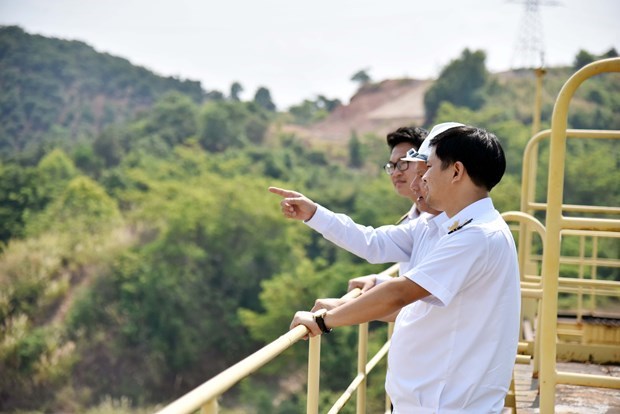 Water in many rivers and canals has been polluted, causing diseases for people. (Photo: VietnamPlus)
Water in many rivers and canals has been polluted, causing diseases for people. (Photo: VietnamPlus)
In many localities, there is still the situation of discharging polluted wastewater into water resources, while there is no consensus among units on solutions to minimise impacts during the appraisal and licensing process.
Lack of international dispute settlement tools
Apart from the inadequacies of domestic management, the SAV also pointed out difficulties and obstacles in implementing the 1995 Mekong Agreement, underlining the need for the Mekong River basin countries to solve these difficulties in order to improve the effectiveness of their cooperation in the future.
On the basis of the audit results, the SAV has proposed the Vietnam Mekong River Commission to assume and coordinate with ministries, sectors and localities related to the implementation of the 1995 Mekong Agreement to study and give consultation to the Prime Minister, and propose the Mekong River Commission (MRC) to develop technical documents and instructions on monitoring water use on tributaries, and maintaining minimum flows.
It also proposed to develop specific provisions and measures to settle disagreements among the MRC’s member countries in managing and using water in the Mekong River basin./.











